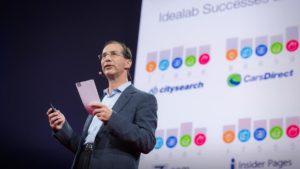
We are happy to announce that we are starting a new section with great TED videos! If you are searching for inspiration, so that is the best place for you! To higher up your English vocabulary all the TED speeches you can read in English and Russian!
Мы рады сообщить, что мы начинаем новый раздел с отличными видео TED!Если вы ищете вдохновение, это лучшее место для вас! Выше ваш английский словарный запас все речи TED вы можете прочитать на английском и русском языках!
The single biggest reason why startups succeed, Bill Gross
Startup… a mainstream word that is familiar even to children. Nowadays, lots of people are obsessed with the ambitious idea of having their own business. Now we want to introduce you a speech made by Bill Gross. Bill Gross is an American investor and fund manager who has a great experience in business. The speaker shares his findings about what factors are crucial for a startup. Which is more important: timing, team, idea, business model or funding? You can find a proper answer after watching the video “The Single Biggest Reason Why Startups Succeed”.
Enjoy watching!

Vocabulary
to be crucial for – to be very important for smb/smth
proper – correct, suitable
enjoy – to have pleasure
to be familiar – easy to recognize
misperceptions – a belief that smth is wrong
failures – the fact that smth/smb not succeeding
make (made/made) sense – to be clear and easy to understand
timing – the ability to do smth at exactly the right time
Слушайте и читайте
скрипт
00:12
I’m really excited to share with you some findings that really surprise me about what makes companies succeed the most, what factors actually matter the most for startup success.
00:12
Я очень рад поделиться с вами некоторыми своими открытиями, удивляющими меня самого, о том, что больше всего делает компании успешными, какие факторы действительно играют роль в успехе стартапа.
00:25
I believe that the startup organization is one of the greatest forms to make the world a better place. If you take a group of people with the right equity incentives and organize them in a startup, you can unlock human potential in a way never before possible. You get them to achieve unbelievable things.
00:25
Я верю в то, что начинающая компания — превосходный способ сделать мир лучше. Если взять группу людей, имеющих один и тот же стимул, и организовать с ними стартап, то можно по-новому раскрыть потенциал этих людей как никогда раньше. Вы подвигнете их к достижению чего-то невероятного.
00:43
But if the startup organization is so great, why do so many fail? That’s what I wanted to find out. I wanted to find out what actually matters most for startup success.
00:43
Но, если начинающие организации так значимы, почему многие из них терпят неудачи? Вот это я и хотел выяснить. Я хотел узнать, что в большей степени влияет на успешность начинающей компании.
00:52
And I wanted to try to be systematic about it, avoid some of my instincts and maybe misperceptions I have from so many companies I’ve seen over the years.
00:52
Избегая некоторых своих инстинктов и, возможно, неверного восприятия, которое сложилось из увиденного за много лет, я решил попробовать свести это в систему.
01:00
I wanted to know this because I’ve been starting businesses since I was 12 years old when I sold candy at the bus stop in junior high school, to high school, when I made solar energy devices, to college, when I made loudspeakers. And when I graduated from college, I started software companies. And 20 years ago, I started Idealab, and in the last 20 years, we started more than 100 companies, many successes, and many big failures. We learned a lot from those failures.
01:00
Я хотел это знать, потому что я занимался открытием компаний с 12 лет, когда продавал конфеты на автобусной остановке в средних классах, делал устройства, работающие от солнечной энергии, в старших классах, и громкоговорители в колледже. После колледжа я занялся компаниями по программному обеспечению. 20 лет назад я открыл Idealab, и за последние 20 лет мы основали более 100 компаний, многие из которых добились успеха, а многие наоборот — потерпели неудачу (провалы). Неудачи нас многому научили.
01:23
So I tried to look across what factors accounted the most for company success and failure. So I looked at these five. First, the idea. I used to think that the idea was everything. I named my company Idealab for how much I worship the «aha!» moment when you first come up with the idea. But then over time, I came to think that maybe the team, the execution, adaptability, that mattered even more than the idea.
01:24
Исходя из этого, я постарался понять, какие факторы больше всего повлияли на успех или провал компании. Я обратил внимание на эти 5 факторов. Первый — идея. Я всегда считал, что идея — это всё. Я назвал свою компанию Idealab, чтобы отразить, насколько я ценю момент, когда идея впервые приходит в голову. Но со временем я пришёл к мысли, что команда, исполнение, умение приспосабливаться значат гораздо больше, чем сама идея.
01:46
I never thought I’d be quoting boxer Mike Tyson on the TED stage, but he once said, «Everybody has a plan, until they get punched in the face.» (Laughter) And I think that’s so true about business as well. So much about a team’s execution is its ability to adapt to getting punched in the face by the customer. The customer is the true reality. And that’s why I came to think that the team maybe was the most important thing.
01:46
Никогда не думал, что буду цитировать боксёра Майка Тайсона на сцене TED, но он однажды сказал: «У каждого есть план, пока он не получает по лицу». (Смех) Я думаю, что это относится и к бизнесу. В командном выполнении задач очень многое зависит от умения приспосабливаться к ситуации, когда клиент наносит такой удар. Потребитель является нашей реальностью. Это натолкнуло меня на мысль о том, что команда, вероятно, важнее всего.
02:12
Then I started looking at the business model. Does the company have a very clear path generating customer revenues? That started rising to the top in my thinking about maybe what mattered most for success.
02:12
Затем я стал рассматривать бизнес-модель. Есть ли у компании чёткий план, дающий доход? Тема ключевых факторов успеха всё больше стала занимать мой мозг.
02:21
Then I looked at the funding. Sometimes companies received intense amounts of funding. Maybe that’s the most important thing?
02:21
Затем я задумался о финансировании. Случается, что компании получают большие суммы на финансирование. Может, это и есть самое важное?
02:27
And then, of course, the timing. Is the idea way too early and the world’s not ready for it? Is it early, as in, you’re in advance and you have to educate the world? Is it just right? Or is it too late, and there’re already too many competitors?
02:27
И, конечно же, выбор времени. Может, ещё не время для этой идеи, и мир пока не готов к ней? Или же она опережает время, и нужно просвещать мир? Удачный момент или уже слишком поздно, потому что появилось много конкурентов?
02:39
So I tried to look very carefully at these five factors across many companies. And I looked across all 100 Idealab companies, and 100 non-Idealab companies to try and come up with something scientific about it.
02:38
Я решил внимательно проследить за этими пятью факторами в разных компаниях. И просмотрел все 100 компаний Idealab и 100 других, чтобы попытаться понять и прийти к какому-нибудь научному выводу.
02:49
So first, on these Idealab companies, the top five companies — Citysearch, CarsDirect, GoTo, NetZero, Tickets.com — those all became billion-dollar successes. And the five companies on the bottom — Z.com, Insider Pages, MyLife, Desktop Factory, Peoplelink — we all had high hopes for, but didn’t succeed.
02:49
Сначала посмотрим на компании Idealab. 5 топовых компаний — Citysearch, CarsDirect, GoTo, NetZero, Tickets.com — достигли миллиардных успехов. Пять последних компаний в рейтинге — Z.com, Insider Pages, MyLife, Desktop Factory, Peoplelink — на них мы возлагали надежды, но они не оправдались.
03:06
So I tried to rank across all of those attributes how I felt those companies scored on each of those dimensions. And then for non-Idealab companies, I looked at wild successes, like Airbnb and Instagram and Uber and Youtube and LinkedIn.
03:06
Я присвоил баллы каждой компании по всем пяти аспектам и, в соответствии с этим, попытался их ранжировать. Потом посмотрел на другие компании, имеющие оглушительный успех, такие как Airbnb, Instagram, Uber, Youtube и LinkedIn.
03:20
And some failures: Webvan, Kozmo, Pets.com Flooz and Friendster. The bottom companies had intense funding, they even had business models in some cases, but they didn’t succeed. I tried to look at what factors actually accounted the most for success and failure across all of these companies, and the results really surprised me.
03:19
И некоторые неудачные проекты: Webvan, Kozmo, Pets.com, Flooz и Friendster. Последние в рейтинге компании хорошо финансировались и иногда даже имели бизнес-модель, но всё-таки провалились. Я старался разглядеть факторы, больше всего повлиявшие на успех или неудачу всех этих компаний. Выводы, к которым я пришёл, меня сильно удивили.
03:37
The number one thing was timing. Timing accounted for 42 percent of the difference between success and failure. Team and execution came in second, and the idea, the differentiability of the idea, the uniqueness of the idea, that actually came in third.
03:36
Главным фактором оказался выбор времени. Он составляет 42% разницы между успехом и провалом. На втором месте — коллектив и исполнение, а идея, её уникальность, отличие от других, оказалась на третьем месте.
03:51
Now, this isn’t absolutely definitive, it’s not to say that the idea isn’t important, but it very much surprised me that the idea wasn’t the most important thing. Sometimes it mattered more when it was actually timed.
03:51
Это не абсолютно однозначно, не то чтобы идея не важна, но меня очень удивило, что идея не играла ключевую роль. Иногда гораздо важнее был момент её запуска.
04:02
The last two, business model and funding, made sense to me actually. I think business model makes sense to be that low because you can start out without a business model and add one later if your customers are demanding what you’re creating. And funding, I think as well, if you’re underfunded at first but you’re gaining traction, especially in today’s age, it’s very, very easy to get intense funding.
04:02
Последние два аспекта — бизнес-модель и финансирование — мне показались логичными. Думаю, невысокий приоритет бизнес-модели обусловлен тем, что начать можно и без неё и подстроиться под неё позднее, если у потребителей есть спрос на ваш продукт. То же с финансированием: если вы сначала недофинансированы, но набираете силу, особенно в наше время, становится довольно легко получить хорошее финансирование.
04:21
So now let me give you some specific examples about each of these. So take a wild success like Airbnb that everybody knows about.Well, that company was famously passed on by many smart investors because people thought, «No one’s going to rent out a space in their home to a stranger.» Of course, people proved that wrong. But one of the reasons it succeeded, aside from a good business model, a good idea, great execution, is the timing.
04:21
Теперь позвольте привести конкретные примеры по каждому фактору. Возьмём широко известную компанию Airbnb, которая добилась невероятного успеха. Компания не привлекала интереса многих умных инвесторов, потому что люди думали: «Никто не будет сдавать площадь в своём доме незнакомцам». Конечно, люди доказали обратное. Помимо удачной бизнес-модели, прекрасной идеи и отличного исполнения, одной из причин, почему проект был успешно реализован, являются сроки.
04:42
That company came out right during the height of the recession when people really needed extra money, and that maybe helped people overcome their objection to renting out their own home to a stranger.
04:42
Компания появилась на рынке в разгар рецессии, когда людям очень нужны были деньги, возможно, поэтому они переступили через своё несогласие
04:51
Same thing with Uber. Uber came out, incredible company, incredible business model, great execution, too. But the timing was so perfect for their need to get drivers into the system. Drivers were looking for extra money; it was very, very important.
04:49
сдавать собственные квартиры незнакомцам. То же самое с Uber. Появился Uber — отличная компания с поразительной бизнес-моделью, великолепным исполнением. Но что ещё важнее, момент для привлечения водителей в эту систему был выбран очень удачно.
05:03
Some of our early successes, Citysearch, came out when people needed web pages. GoTo.com, which we announced actually at TED in 1998, was when companies were looking for cost-effective ways to get traffic. We thought the idea was so great, but actually, the timing was probably maybe more important. And then some of our failures. We started a company called Z.com, it was an online entertainment company. We were so excited about it — we raised enough money, we had a great business model, we even signed incredibly great Hollywood talent to join the company. But broadband penetration was too low in 1999-2000. It was too hard to watch video content online, you had to put codecs in your browser and do all this stuff, and the company eventually went out of business in 2003.
05:01
Водители искали возможность дополнительного заработка, это было важно. Один из наших ранних успехов, Citysearch, возник, когда была нужда в веб-страницах. GoTo.com, сайт, анонсированный на TED в 1998 году, появился, когда компании искали экономически эффективные способы получения трафика. Мы думали, что идея грандиозна, но на самом деле, сроки были более важны. А вот несколько наших неудач. Мы запустили Z.com — компанию с онлайн-развлечениями. Мы были так взволнованы, собрали достаточно денег, построили отличную бизнес-модель и даже подписали контракт на сотрудничество с голливудской звездой. Но широкополосный Интернет не был слишком распространён в 1999-2000 гг. Было тяжело смотреть видео в режиме онлайн — приходилось устанавливать кодеки в браузер.
05:39
Just two years later, when the codec problem was solved by Adobe Flash and when broadband penetration crossed 50 percent in America, YouTube was perfectly timed. Great idea, but unbelievable timing. In fact, YouTube didn’t even have a business model when it first started. It wasn’t even certain that that would work out. But that was beautifully, beautifully timed.
05:37
Поэтому компания в конечном счёте ушла с рынка в 2003 году. Всего двумя годами позже, когда программа Adobe Flash решила проблему с кодеками, а широкополосный Интернет был у 50% потребителей в Америке, тогда, очень кстати, появился YouTube. Грандиозная идея — и невероятно своевременно. Когда YouTube появился, у него даже не было бизнес-модели. Компания не была уверена, что вообще выживет. Но появились они на редкость вовремя.
05:59
So what I would say, in summary, is execution definitely matters a lot. The idea matters a lot. But timing might matter even more. And the best way to really assess timing is to really look at whether consumers are really ready for what you have to offer them. And to be really, really honest about it, not be in denial about any results that you see, because if you have something you love, you want to push it forward, but you have to be very, very honest about that factor on timing.
05:59
Подводя итоги, я бы сказал, что исполнение, безусловно, много значит. Идея играет важную роль. Но расчёт времени может сыграть ещё бо́льшую. И самый лучший способ просчитать сроки — оценить готовность потребителей к тому, что вы хотите им предложить, и быть до конца честными с собой, не отрицать очевидные результаты, ведь когда что-то очень нравится, хочется это протолкнуть, но нужно трезво оценивать такой фактор, как выбор времени.
06:23
As I said earlier, I think startups can change the world and make the world a better place. I hope some of these insights can maybe help you have a slightly higher success ratio, and thus make something great come to the world that wouldn’t have happened otherwise.
06:23
Как я ранее сказал, стартапы могут изменить мир в лучшую сторону. Я надеюсь, что эти мысли, возможно, будут вам полезны и увеличат ваш успех, таким образом привнося в мир что-то замечательное, что иначе могло бы и не случиться.
06:35
Thank you very much, you’ve been a great audience. (Applause)
06:35
Спасибо большое, вы прекрасные слушатели. (Аплодисменты)




